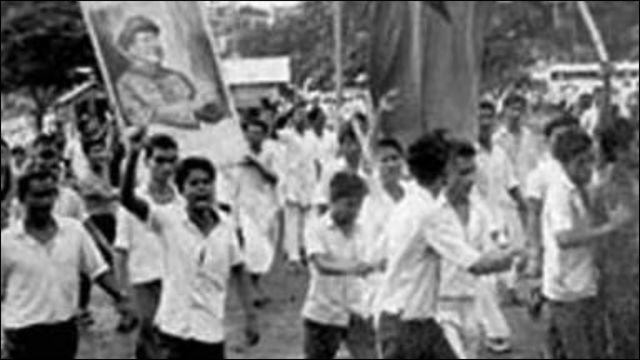An Appeal to Indian Marxists
17 Nov 2025 11:42:36

Karl Marx undeniably holds a significant place in world history. He was a great thinker who authored The Communist Manifesto around 175 years ago based on European conditions, the emerging scientific knowledge of his time, and the experiences available to him. Yet today, writers, lawyers, journalists, and others who consider themselves intellectuals continue to proclaim authoritatively that Marx's theories, formulated long ago, will inevitably lead to social transformation. Attracted by such slogans, many believe that Marxist ideology can unite people in establishing revolutionary governments that will ultimately result in a stateless society. Some have even taken up arms, attempting to eliminate all who contradict them or refuse to follow their line.
While Marx's greatness cannot be denied, an unrealistic attitude has taken root. The belief that all of humanity can logically be divided into two classes has proven problematic. Even Engels, who was close to Marx, warned that Marxism is not a dogma to be memorised and chanted but merely a guide for action.
The Historical Context of Marx
Europe during Marx's era witnessed severe exploitation. Feudalism had created rigid hierarchies where aristocrats controlled land and exploited peasant labour. The emerging capitalist system brought its own forms of exploitation, with factory owners wielding power over workers who had no choice but to sell their labour to survive.
The prevailing philosophical justification for these systems was idealism, particularly Hegel's philosophy, which treated existing social and economic structures as rational expressions of historical development. Marx criticised this view because, according to him, it justified exploitation by presenting capitalism as the logical unfolding of the "Absolute Idea" rather than recognising it as a system built on the ownership of production by one class and the exploitation of another.

To counter this, Marx developed "materialism", the application of scientific principles to human life, which argued that material conditions and economic relationships shape ideas, not the other way around. Science confirms what has been proven but also accepts changes over time, embraces new theories, and rejects outdated concepts.
However, it is not practically possible to assess the entirety of human life through science alone. Marx asserted that his experiences constituted permanent guiding principles for all of humanity. Any medicine is effective only within a time limit; beyond that, it turns into poison. Marx failed to understand this dividing line.
Moreover, Marx stated decisively that some of his theories applied to the future. He predicted that economic crises would often arise in capitalist societies due to internal contradictions. During each crisis, he believed, workers would awaken and join the Communist Party. He anticipated that wealth would increasingly flow toward machinery, decreasing workers' income. When the majority of workers awakened, he argued, revolution would follow, inevitably an armed one occurring in the wealthiest countries.
The Failure of Marxist Predictions
Marx stated that the middle class, intellectuals, and farmers would have no role in the Communist revolution. Yet proletarian dictatorship never materialised in Europe. Despite Marx's view that peasants were not a revolutionary force, revolutions occurred in Russia and China, both predominantly agricultural countries. India experienced the Telangana peasants' armed struggle from 1948 to 1951.
The world economy did not follow the course Marx predicted. Social democrats gained the upper hand in Europe. Russia and China's attempts to grow as imperialist powers led to the formation of Communist parties in several countries. Just as outdated drugs turn poisonous, Marxism became obsolete within one generation and failed to play a decisive role in human life.

Revolutionary struggles exported by China and the Soviet Union sparked armed conflict in Telangana and the Naxalbari movement that began in 1967 and continues today. Revolutions did not occur in Europe, where capitalism and the working class were expected to flourish. In Russia, Lenin applied Marxist principles to Russian conditions, developing what is known as Leninism. Similarly, in China, Mao integrated Marxist theory with Chinese realities, an application known as Maoism.
Sacrifice has no place in dialectical materialism, yet Marxists appeal to all to make sacrifices. Marxism is thus a bundle of contradictions. These contradictions are not useful to the present generation; how could they benefit future ones?
The Indian Experience
Despite this, those who consider themselves intellectuals in India have tried to apply outdated Marxism to present-day conditions and divert people toward armed struggles. Their efforts have led to human tragedy rather than human well-being.
Against this backdrop, all who think themselves intellectuals should dispassionately review the policies they believe in. There is a pressing need to analyse the Marxist armed struggle that has spread across the country for over thirty years. The recent surrenders and encounters of Maoists in forests have increased the necessity of reviewing centuries-old Marxism and its repercussions.
Each person can undertake this analysis according to their own experiences; that is the peculiarity of human life. To think that the same principles would apply to all countries, all people, and all times, without recognising this reality, indicates a lack of mental maturity. The existence of such freedom in democratic culture creates hope that it will guide humanity's way of life at this stage of evolution.
The Blunder of Rejecting Indian Philosophy
Indian intellectuals have believed that Marxist philosophy codifies all basic truths of human life. But to think that Western philosophy provides a total view of human life without any faith in Indian philosophy is a blunder. The Indian search for truth, which has a history of thousands of years, remains incomplete.
The human mind is profoundly valuable. It traverses a path of constant conflict in its attempt to remain eternally fresh, absorbing all changes that occur in nature due to the eternal march of time. Without realising this basic philosophy and trying to cross the river with Western trends of thinking is like attempting to swim with the help of a straw.
However great a philosophy might be, it should not limit itself to rationalism alone. A comprehensive philosophy must have a total vision of human life and be universal. Only such a philosophy can become eternal. That is why Marxism could not become a source of eternal values. A partial view of life created from Marx's personal experiences could not stand the test of time.
The Failure of State Power Alone
This is where Indian intellectuals are failing in their attempts to dictate human lives with immature attitudes and thoughts. State power alone cannot dictate human existence. Attempts to do so lead to human tragedy. When state power is lost, people categorically reject such philosophies. The differences between Indian and Western attitudes become clear in this respect.
Some people, under the influence of mental slavery imposed by centuries of foreign rule, claim that the Indian view of life is unsuited to modern times and that the country has no salvation. They are tempted to impose restrictions and limitations on human life, yet they fail in these efforts.

Communist parties that tried to bring independent India under Marxism's influence failed. They never taught people work culture or accountability. They attempted to teach licentiousness in the name of progress. That is why no Communist-ruled country has achieved economic self-reliance. Whenever there was opportunity, they resorted to the exploitative practices of Western imperialist countries.
Indian Marxist intellectuals have rejected nationalism in the name of internationalism, living under the illusion that social progress can be achieved only through reforms implemented by state authority. Rejecting Marx's view that peasantry is not a revolutionary force, they achieved state power through peasant struggles and became responsible for human tragedy rather than well-being.
A Call for Reflection
Intellectuals who claim to understand Marxism alone, who insist that state power is essential and that the gun is the only means to achieve it, should once again study the history of the Soviet Union, China, and other countries. That historical responsibility must be fulfilled for humanity's sake.
To think that the same principles would apply to all countries, all people, and all times, without acknowledging the unique characteristics of each context, reflects intellectual immaturity. The current moment demands honest reflection, not dogmatic repetition.
Human well-being, not human tragedy, must be the measure of any philosophy's worth. When ideology leads to bloodshed rather than liberation, when it destroys rather than builds, the time has come to acknowledge its failure and chart a new course grounded in reason, history, and the enduring values of Indian thought.
Article by

Aadarsh Gupta
Young Reseacher